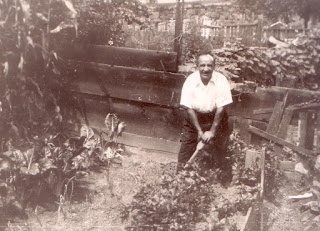Joseph Nigro, my paternal grandfather, first came to America with his father as a six-year-old boy in 1898. William McKinley was the president at the time. Father-son returned to
their hometown, Castelmezzano, Italy, for several years after that, but they couldn't resist the allure of the states.
Their peripatetic ways were all about finding work and earning some decent money in what were hardscrabble times. Their native land was not exactly a land of opportunity. When, however, my grandfather reached young adulthood, he resented the old school ways of turning over everything he earned to his father and receiving—in return—a meager allowance. Understandably, he wanted to keep the fruits of his labor and forge a life of his own. His father, though, found such a request beyond the pale and wouldn’t give an inch. This father-son dispute set the wheels in motion.
Having more than he could stomach of what was, in essence, indentured servitude, my grandfather hopped on a boat back to Italy, which proved to be very poor timing on his part. For it was the eve of World War I and he was, upon his return, promptly drafted into the Italian army. My grandfather spent a couple of years in a German prisoner of war camp, where enemy combatants weren’t exactly treated humanely. But fortunately, he made it home—alive and in one piece after the war—when so many men didn’t. He also made it back to the United States. This go-round, though, he was his own man and wasn't about to turn over any of his earnings to a higher authority. In the mid-1920s, my grandfather brought his wife and daughter—my grandmother and aunt—to live here. They would all become Americans. My father and a brother were born on American soil several years later during the Great Depression, which was around the time my grandfather founded his own ice business. He was an iceman when most people had iceboxes in their homes and refrigerator technology was in its infancy. The man lugged countless heavy blocks of ice up countless flights of stairs in the tenements that housed the preponderance of his customers. He had some business clients, too, including the Lucky Club, a speakeasy on Broadway in the Morningside Heights section of Manhattan.
Upon making an ice delivery at the Lucky Club one afternoon, my grandfather was confronted by a man who made him an offer he couldn't refuse. He was informed that all of his wholesale ice purchases would thereafter be made through this hoodlum's outfit. Of course, the
cost of the ice would be somewhat more than he was paying. My grandfather said no in no
uncertain terms to this business arrangement, and was told something to the effect of
“We have ways of making you change your mind.” A short time later, two men set upon my grandfather as he exited the Lucky Club after making an ice delivery. And they made the same proposal. Buy the ice
from us...or suffer the consequences. My grandfather informed the pair of goons to, in effect, take a hike. They didn’t take kindly to the suggestion. In fact, they were about to
show him the “ways” they had to make a person change his mind when my grandfather pulled
out an ice pick from his pocket and thrust it toward them. He exited the club forthwith, wondering if what he had done was the wisest thing to do. After all,
Mafia hoods didn't subscribe to the
philosophy, “May the best man win,” which, in this instance, was definitely my grandfather.
He worked very hard for his money—and it wasn’t a whole lot in those days—and didn’t intend on sharing it with slimy thugs.
As fate would have it, my grandfather knew a neighborhood
police captain who had some sway with the local wiseguys. The cop put in a good word
for him and requested he be left alone—and that no retaliation come
his way. My grandfather never did buy his ice from the syndicate. And this intercession turned out providential for a whole host of people, including me, who
might not have been born thirty years later without it. While my grandfather’s ice
business melted away in the 1940s, when refrigeration became accessible to the
masses, he nonetheless had saved up enough money to buy a house of his own in the
Kingsbridge section of the Bronx. He worked at the Sheffield Milk plant—first in the Bronx and then in Brooklyn—until
the day he retired. And he needed no helping hands from the Luca Brasis of the world.
(Photos from the personal collection of Nicholas Nigro)
(Photos from the personal collection of Nicholas Nigro)



No comments:
Post a Comment
Note: Only a member of this blog may post a comment.